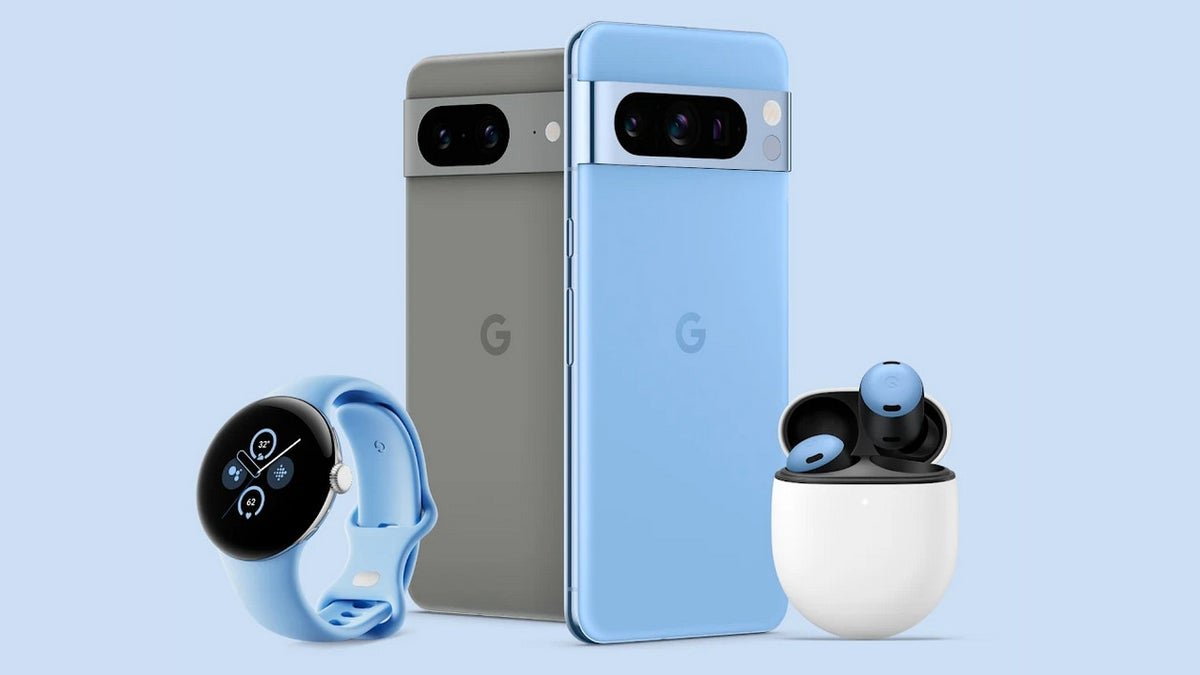Arriving in October 2023, the Google Pixel 8 and Pixel 8 Pro represented a confident stride forward, building upon the foundation of the previous two generations. Powered by the new Tensor G3 chip, this lineup leaned heavily into helpful AI-driven features, boasted significantly upgraded displays, offered further camera refinements, and set a new industry benchmark with an unprecedented seven-year software update promise. This generation also saw a price increase, with the Pixel 8 starting at $699 and the 8 Pro at $999.
Design: Softer Curves, Brighter Views

While maintaining the overall aesthetic established by the Pixel 6, the Pixel 8 series introduced subtle but welcome refinements:
- Refined Camera Bar: The signature camera bar remained but evolved. On the Pixel 8, both lenses were housed within a single pill-shaped glass cutout. The Pixel 8 Pro used a similar large pill for the main and ultrawide, plus a separate circle for the telephoto lens, all within the polished metal bar that blended into the frame.
- More Rounded Corners: Both models featured noticeably softer, more rounded corners compared to the Pixel 7 series, making them feel more comfortable to hold.
- Flat Screen for Pro: In a move lauded by many, the Pixel 8 Pro ditched the curved display edges of its predecessors for a completely flat screen, matching the standard Pixel 8.
- Premium Materials: Continued use of Gorilla Glass (Victus on Pixel 8 front, Victus 2 on Pixel 8 Pro front/back) and recycled aluminum frames, along with IP68 water/dust resistance.
- Colors: Pixel 8 launched in Obsidian, Hazel, and Rose. Pixel 8 Pro came in Obsidian, Porcelain, and a striking Bay (blue). No headphone jack, as expected.
Hardware: Tensor G3, Super Actua Displays, and a Temperature Check
The Pixel 8 series brought notable internal upgrades:
- Google Tensor G3: The third iteration of Google’s custom chip focused again on AI and machine learning advancements over raw benchmark scores. Built on a more efficient 4nm process with updated CPU cores (including a powerful Cortex-X3) and an upgraded Mali-G715 GPU, it enabled more complex on-device AI features and improved power efficiency. The Titan M2 security chip remained integral.
- RAM & Storage: The Pixel 8 included 8GB of faster LPDDR5X RAM, while the 8 Pro offered 12GB. Storage options used fast UFS 3.1 technology.
- “Actua” Displays: Google introduced new branding for its significantly brighter OLED displays. The Pixel 8’s 6.2-inch “Actua Display” reached up to 2000 nits peak brightness with a 60-120Hz variable refresh rate. The Pixel 8 Pro’s 6.7-inch “Super Actua Display” (LTPO, 1-120Hz) was even more impressive, hitting up to 2400 nits peak brightness – making both phones exceptionally easy to view outdoors.
- Secure Face Unlock: A major upgrade arrived for Face Unlock. On both Pixel 8 models, it met Android’s highest biometric standard (Class 3), allowing it to be used not just for unlocking the phone, but also for secure actions like mobile payments and app sign-ins, alongside the improved optical under-display fingerprint sensor.
- Battery & Charging: Battery capacities saw slight increases (4575mAh for Pixel 8, 5050mAh for 8 Pro). Wired charging speeds got a minor bump (up to 27W for P8, 30W for P8P), alongside wireless and reverse wireless charging.
- Temperature Sensor (Pro Exclusive): The Pixel 8 Pro included a novel infrared temperature sensor below the flash on the camera bar, initially allowing users to measure the temperature of objects. Google later obtained FDA De Novo classification, enabling it to measure human body temperature via a dedicated app.
Cameras: Hardware Tweaks Meet Powerful AI Editing
Camera hardware saw targeted improvements, but the big story was the new AI-powered editing features:
- Pixel 8: Upgraded the 50MP main camera for better light sensitivity (f/1.68 aperture) and crucially added autofocus to its 12MP ultrawide lens, enabling Macro Focus capabilities previously exclusive to the Pro model.
- Pixel 8 Pro: Featured the same improved 50MP main sensor, plus upgraded 48MP ultrawide (wider aperture, better macro) and 48MP telephoto (5x optical zoom, significantly improved light sensitivity) cameras.
- New AI Features:
- Best Take: Magically combines faces from a burst of group photos so everyone looks their best (no blinking!).
- Magic Editor: A powerful generative AI tool allowing users to reposition subjects, change skies, remove larger objects, and more within Google Photos.
- Audio Magic Eraser: Intelligently identifies and reduces distracting background noises (wind, crowds, etc.) in videos.
- Video Boost & Night Sight Video (Pro Exclusive): Cloud-processed enhancements to dramatically improve video dynamic range, color, and low-light performance.
- Pro Controls (Pro Exclusive): Offered manual adjustments for shutter speed, ISO, and more within the camera app.
- Photo Unblur, Real Tone, Magic Eraser, Motion Mode, and Cinematic Blur continued to impress.
Software: Android 14 and Unprecedented Support
Launching with Android 14, the Pixel 8 series delivered Google’s latest OS refinements. But the groundbreaking announcement was the software support commitment:
- Seven Years of Updates: Google pledged an industry-leading seven years of support for both the Pixel 8 and 8 Pro, including major OS upgrades, security patches, and regular Feature Drops, promising support all the way to 2030.
Reception and Legacy: The AI Phone Sets a New Standard
The Pixel 8 and 8 Pro received very strong positive reviews. The incredibly bright displays, refined ergonomics (especially the flat Pro screen), powerful AI camera and editing tools, upgraded Face Unlock security, and the landmark 7-year update promise were universally praised. Google’s focus on helpful AI features felt more realized than ever.
Minor criticisms included the price increase, the Tensor G3 still lagging slightly behind competitors in peak performance benchmarks, charging speeds remaining decent but not class-leading, and the niche appeal of the temperature sensor for some. However, the Pixel 8 series solidified Google’s vision for an AI-centric smartphone and set a new standard for long-term software support in the Android world, making them highly compelling choices.
